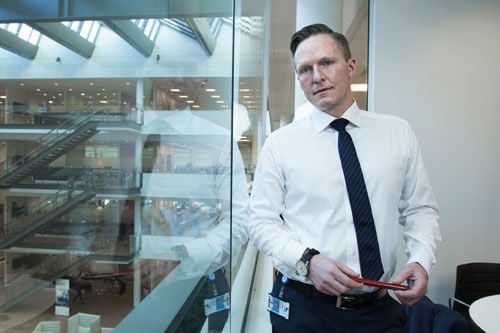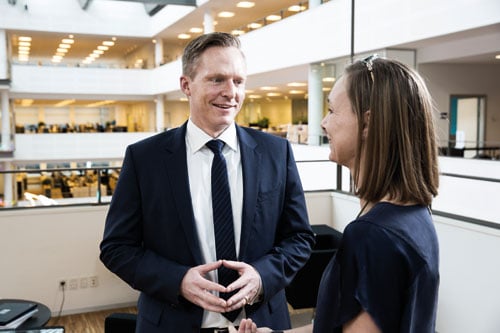
If the changes of the last five to ten years have shown us anything, it’s that ‘business as usual’ is no longer good enough. Against a backdrop of challenging market change payers, patients and prescribers are demanding a different approach from pharma.
Thanks to the lingering effects of austerity budgets – and their influence on pricing debates, meeting the needs of payers may prove to be the most challenging for the industry. It’s no longer enough for companies to take a product through research and development and launch it with a traditional brand campaign – though that’s still very much needed, of course. But the question is how to go beyond that.
“What’s happening is that the perceived value of innovation from the external community is changing,” explains Novo Nordisk’s Christian Kanstrup. “As that changes with payers we need to focus on how we can add to the value that’s generated in R&D and address the unmet needs of the physician, patient and payer.”
Appointed senior vice president for marketing, medical affairs and stakeholder engagement (MMASE) last August, Christian has both a ringside seat for the changes sweeping the industry and a key role to play in Novo Nordisk’s response to them.
When we meet at the Danish company’s office on the outskirts of Copenhagen, Christian describes his current role as one whose ultimate focus is on “improving patient outcomes by securing access to our innovation”.
For a company that traces its heritage back to the early 1920s and the manufacture of the medical revolution that is insulin, much of that innovation is diabetes-focused – which is unsurprising given the condition accounts for around 80% of Novo’s business today. But a more recent entry into obesity, plus its interests in haemophilia and growth hormone disorders, provide important additions to its portfolio. Whatever therapy area the company focuses on, “the starting point is the patient”, says Christian.
Signs of the times
In order to bring that about a critical part of his role is in ensuring the marketing, medical affairs and stakeholder engagement functions collaborate in a seamless fashion. Explaining the need for this approach Christian says: “If we look at the world today, it’s getting very complex, both in terms of the way healthcare systems work and what’s happening in the payer environment, as well as being able to ensure that our patients get access to innovation.”
He highlights the global roll-out of its blockbuster diabetes drug Victoza – currently one of the 50 best-selling medicines in the world – as a prime example of how these functions work together. Launched in its first European markets in 2009, this was a time that set the model for Novo’s current launch process – one that it is calling upon for key new products – such as basal insulin Tresiba and its Ryzodeg and Xultophy combinations.
“To ensure that we bring these to market successfully, we need to have a close collaboration between the three areas, and that’s where the launch process is a great example,” Christian explains.
“We start three years before a launch doing the medical planning. Then two years prior to the launch, we start the actual execution of the scientific activities to make sure that we create the right foundation. Then that is combined with the market access activities, as well as the public affairs activities, which are being driven from other areas, ensuring that we enable the right communication.
“And then at, say, one year before launch, we have the brand or the traditional marketing-related activities starting to prepare for the actual launch and the roll-out of the product.”
My ambition is that we optimise the way we work to further improve access to our innovation
Strategic contributions
While it may be a slightly unwieldy acronym, the MMASE functions certainly lead the pharma zeitgeist. But wind the clock back to 1999 when Christian joined Novo and it was the worthy, but less front-line, corporate treasury department that gave him his first pharma role. Putting his masters of science in economics to good use, the focus at that time was on managing the company’s currency exposure, before a growing fascination with the company’s products and therapy areas saw him move to investor relations – “a great way to learn about the business”.
“You need to know all about the company – from early research to the way we market our products. You also get exposed to a lot of very knowledgeable external analysts and investors,” he says.
After a two-year spell in the US heading Novo’s North America investor relations activities, Christian returned to Copenhagen and spent five years leading Novo’s M&A and licensing, as well as the corporate strategy as corporate vice president of corporate strategy and business development.
With the industry-wide focus on striking the best deals to bolster internal activities with external innovation, it was the start of a career trajectory that would see him work in a series of key positions.
“It’s absolutely critical to find the right partners,” Christian says. “But it’s also clear that you need to ensure you have the right balance between internal innovation and external innovation.”

Strategy-wise, it was also an important time for Novo as it devoted a lot of time to refining its diabetes research strategy, including a project – that Christian headed – to evaluate if the company should continue its efforts in small molecule R&D. This concluded in 2007 with the announcement of Novo’s exit from that side of diabetes research, which was viewed – both within the company and by the outside pharma community – with no small degree of scepticism, given the significant part played by oral anti-diabetic medicines.
“In hindsight, focusing our research and development efforts on protein-based treatments for diabetes proved to be the right decision, because it enabled us to develop our drug portfolio and our pioneering effects in oral insulin,” he explains. These efforts moved up a gear last year when Novo decided to enter into phase III trials with an oral GLP-1. Nonetheless, delivering on the promise of a protein-based medicine in the form of a tablet and successfully producing it on a large scale will be a major challenge for the company.
The decision-making for this direction was based on the company’s heritage and a cold hard look at where it performs well. “For more than 90 years we have been developing protein-based treatments for diabetes and other therapeutic areas,” Christian says, “so that is what we are good at.”
The rate of change [in China] was amazing … people want to develop the organisation and make a difference
Cultural changes
After concentrating on Novo’s strategic direction, Christian headed east with a posting to Tokyo as head of finance, legal and IT for Novo’s Japan and Korea region. It was a move that proved to be a great learning experience, on a number of levels.
“When all of a sudden you find yourself in a very different cultural setting, that’s when you get a lot of insight into both how you see yourself, but also how others see you,” he says.
Something that gave Christian pause for thought before he arrived at Narita International Airport was his typically direct Scandinavian personality and how it would be received working in a country where the culture is generally more of an indirect one.
“Should I change my direct behaviour in order to better integrate with the Japanese organisation? What I decided is that I believe very much in authenticity, so I would rather be authentic, be myself, than trying to change very much my direct behaviour.”
Considerations of personality and how to work with a different part of the Novo organisation proved to be a useful exercise. “It was an extremely good learning tool to help understand what your impact is on an organisation and the people that you interact with,” Christian says.
But a bigger challenge was looming on the horizon when, just two months after moving to Japan in 2011, a powerful earthquake struck the country’s main island, causing a series of large tsunami waves that devastated many coastal areas. “Being from Scandinavia, I had never experienced an earthquake before, so that was a fairly scary experience,” he admits. The most pressing need was how to manage and steer the organisation through the situation, ensuring “as the absolute first priority that our people were safe”.
It was a time of concern for all pharmaceutical firms operating in Japan as they scrambled to locate employees while maintaining supplies of medicines to the healthcare system. But for Novo an added worry came from the proximity of its manufacturing site to the Fukushima nuclear power plant, which lost power after the earthquake and then was flooded by a 15 metre tsunami, causing a series of meltdowns.
“We needed to ensure that people were safe. Then we needed to ensure that our insulin was made available to people in Japan. At the same time, you need to make sure you effectively steer the organisation through a very uncertain and turbulent time.
“That also gave a lot of insight into how do you handle unexpected crises. How you handle unexpected situations and the magnitude of these unexpected changes? That gave a lot of insight into how you act in a crisis situation and how you align an organisation and keep the spirits high, even though you have a significant disturbance in the business.”

A challenge of a different magnitude awaited Christian when his Japan posting was followed some three years later with a move to China for a larger Far East role. As SVP of Novo’s ‘Region China’ he took on responsibility for the company’s commercial operations in mainland China, Taiwan and Hong Kong.
The country’s economy may now be experiencing a slowdown, but Christian’s time in the country saw its pharmaceutical market grow rapidly, something that was very evident to those at the frontline.
“The rate of change was absolutely amazing,” he says. This momentum was reflected in Novo’s operations in the country. “My organisation in China has an extreme candour – they’re very direct in terms of ‘yes, we do this’, and then they just get things done. People want to develop the organisation and they want to make a difference – so there’s a lot of energy.”
However, the situation in China was about to change significantly. Christian took up his China Region post in August 2013, when the full ramifications of the bribery scandal at GlaxoSmithKline had yet to unfold. It was to culminate with the largest corporate fine in China’s history and made waves for the whole pharma industry, particularly foreign companies.
Suddenly a new approach was demanded in the way all companies operate in the country. For its part, Novo began an ongoing programme to direct its sales people away from “a more relationship-focused way of selling to a scientific-based way of selling”.
“What’s happening in China now is, in principle, not different than what has happened in most of the pharmaceutical markets across the world as they mature. The only difference is in China the change is faster,” Christian notes.
Focusing our research and development efforts on protein-based treatments proved to be the right decision
New world solutions
Another area of rapid change is the digital health arena, which Christian says has an important contribution to make when it comes to generating new commercial innovations for his company. “If you ask 50 different people for a definition of digital health, you’d probably get 50 different views. But the way we think of digital health is how the application of these technologies can generate what we call ‘actionable insights’ in terms of the data available. These could enable the patient to improve control or quality of life, the physician to better treat the patient or the payer a better ability to grant access to drugs.”
The intersection of digital health, data and – hopefully – actionable insights was the focus of a particularly interesting deal Novo recently struck with IBM Watson Health – which applies more than 70 million anonymous medical records to the Watson supercomputer’s cognitive computing abilities. It will see the partners jointly develop a digital platform to help diabetics and their doctors manage their illness, with a number of ‘solutions’ expected to emerge from this work. These are likely to provide tools for patients, physicians and payers, all with the ultimate goal of generating insights into the optimum treatment of diabetes.
“This is new territory for us, as it is for many in the industry. From our own point of view, we need to ensure that our devices have connectivity – you need to be able to store and transfer the data on your insulin consumption. Here we will have the first global device ready for clinical testing later on in this year, and then we need to combine that with what we are doing with IBM Watson.”
It will still be a number of years before an integrated offering is on the market, but Christian’s hope is that existing data can be used within a shorter timeframe to generate insights that can be applied to improving outcome for patients or engaging in a dialogue with payers.
Looking ahead to its product launch plans and Christian’s mind is on the “increasingly challenging” payer environment and ensuring patient access to Novo’s products.
“My ambition and aspiration is that we, by optimising the way we both work internally and the way we work externally, be that leveraging new technologies, such as digital health, or be that optimising the way we’re executing, can further improve access to our innovation.”
He concludes: “One of the things that we need to do is align the whole commercial organisation around enhancing the value that’s generated in R&D. We need that to succeed now, and for sure we need that to succeed in five and 10 years.”




